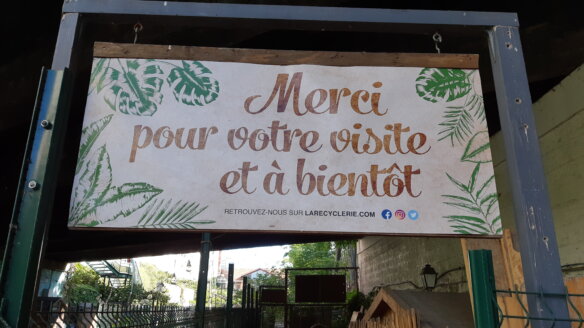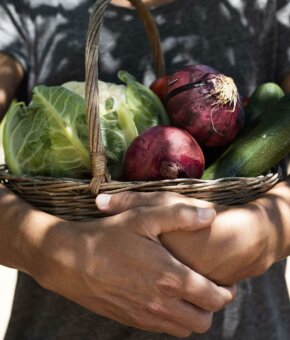
A remarkable transformation is taking place in one of Europe’s most densely populated capitals. Paris is turning famous hotspots such as the Champs-Elysées into green corridors, cars are making way for cyclists and pedestrians and urban farms are popping up all over the City of Light. It’s all part of a bid to transform Paris into a greener, cleaner and safer city and to make services accessible to residents within 15 minutes of their homes. Including locally grown food.
When Anne Hidalgo was elected mayor in 2014 she declared the ambitious plan to cover 100 hectares of Parisian walls, facades, and rooftops with greenery, of which one-third being dedicated to edible crops. One of the central ideas in her successful re-election campaign in 2020 was the pledge to turn Paris into a “15-minute city”, where residents have access to services such as schools, health centers, and restaurants, all within 15 minutes of their home.
Access to locally grown food is one of the focus points of the 15-minute city and programs such as “Les Parisculteurs project” encourage and facilitate local food production in the French capital. With space being limited, Parisians are getting creative in bringing back agriculture to the urban area, and urban farms are appearing in some of the most improbable places.
1. Sous les fraises
Sous les fraises is managing several urban farms across Paris, including a rooftop farm on top of the famous Galleries Lafayette Hausmann, where more than 150 varieties of edible plants are grown. In the morning, chefs gather their fresh ingredients to create their lunch dishes.
2. Bergers Urbains
Sheep are making a regular appearance in Paris. To enhance biodiversity, make urban soil productive, and replace petrol-powered lawnmowers, the urban shepherds of Bergers Urbains are moving around the capital with their sheep. They are grazing parks, urban farms, and produce wool.
3. La REcyclerie
Located in a disused train station, this eco-hotspot is more than ‘just’ an urban farm. It’s a ‘third place’ (neither home nor work), where citizens and entrepreneurs are coming together to create a more sustainable world. La REcyclerie has over 500 members and 100 volunteers and offers locally grown food, free repairs of household appliances, courses, seed swaps and other community activities such as concerts and reading clubs.

4. Cycloponics – farming underground
With more people swapping their cars for greener alternatives, a growing number of underground parking spaces in Paris is being abandoned. With a relatively steady temperature, they form the perfect environment for cultivating mushrooms, which is exactly what Cycloponics is doing. Besides mushrooms, the 3.500m2 of La Caverne farm is also home to a variety of microgreens and other crops such as endives.
5. Clos Montmartre – the last vineyard in Paris
Montmartre was once covered with vineyards, but rapid urban development wiped out all of them around 1930. Except for one. At the petitioning of artist Francisque Poulbot, one parcel was saved. Although in the eyes of many, the approximately 1.500 bottles of wine produced a year at Clos Montmartre, are more a novelty than a quality product, the vineyard reminds Parisians and tourists of how agriculture used to be part of the city.
6. Nature Urbaine
Right on top of Paris Expo’s Pavillon 6 in the southern 15th arrondissement, the 14.000 square meter Nature Urbaine rooftop farm is providing Parisians with fresh lettuce, tomatoes, strawberries, beets, and other organic fruits, vegetables, and aromatics. The rooftop farm uses aeroponics: a soil-free technique that requires minimal irrigation and that maximizes the amount of produce per square meter.
7. La Louve – the co-operative supermarket
Although co-operative supermarkets aren’t new to France, La Louve proposes a slightly different approach. Every member commits to 3 hours of monthly – unpaid – work at the supermarket. This enables La Louve to keep costs for customers lower than in traditional supermarkets. As such, organic, fresh and locally produced food becomes accessible to a broader group of Parisians.
8. Veni Verdi – learning gardens
Veni Verdi believes that it’s essential for all kids to learn where their food is coming from, what it takes to cultivate crops, and how we can take care of our planet and its biodiversity. That is why Veni Verdi is establishing ‘learning gardens’ all over Paris: urban farms on school grounds. At the Pierre Mendès France Middle School, for instance, children are tending a 4.500 m2 urban farm. Besides caring for the crops and (partly) feeding the families, produce is also sold to neighbours.
Were you inspired by this article on how Paris is transforming into one big food-producing community? Make sure to sign up for our monthly newsletter, with more stories about cities turning into sustainable urban delta.



